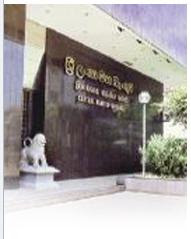July 16, 2010 (LBO) - Sri Lanka's northern and eastern provinces slightly increased their share of national Gross Domestic Product last year compared with 2008 following the end of a war, the Central Bank said.
The western province remained as the highest contribution to GDP in 2009 but its share reduced further to 45.1 percent from 45.4 percent in 2008, it said in an analysis of provincial GDP.
The contribution of the northern province to the GDP improved slightly to 3.3 percent in 2009 compared to 3.2 percent in 2008.
"This was a positive development that may be observed since the ending of the 30-year old conflict," the statement said.
"There was no significant expansion of the contribution of the northern province to GDP as the impact of the improvement in consumer and investor confidence in the aftermath of the civil war will only be felt by the economy with a time lag."
The island's ethnic conflict ended in May 2009 when Tamil Tiger separatists were defeated by government forces, resulting in an immediate upturn in the national economy as hitherto unproductive regions came back into production.
The northern and eastern regions were the worst affected by the war.
The eastern province's contribution to total GDP edged up to 5.8 percent in 2009 compared to 5.6 percent in 2008.
The western province contributed significantly to GDP in the country as most of the economic activities that relate to the sea port, air port, banking and financial institutions and business centres are still centralized in the province.
"Even though the western province account for the highest share of GDP so far, the performance in 2009 indicates a reduction in the disparity among provinces," the central bank said.
The north-western province became the second highest contributor to GDP in 2009 pushing the southern province into third place.
The north-western province increased its contribution to 10.3 percent in 2009 from 9.9 percent in 2008 while the share of the southern province fell to 10.2 percent from 10.5 percent in 2008.
The per capita income in the western province which stood at 3,259 US dollars was 1.6 times the national per capita income both in 2008 and 2009, the central bank said.
"All other provinces continued to fall below the national per capita income."
In the northern and eastern provinces the ratio between per capita income of the province and national per capita income improved marginally in 2009, while in the central and southern provinces the ratio declined marginally.
source - www.lbo.lk

No comments:
Post a Comment